Dave Milbrandt's Blog, page 5
November 20, 2017
Reality Used to Be a Friend of Mine
 Creative Commons photo by Space Pirate Queen Since I previously wrote about why I like to set my work in slightly fictionalized locales, I'd like to take on the problem with using exclusively using real places and products in my writing.
Creative Commons photo by Space Pirate Queen Since I previously wrote about why I like to set my work in slightly fictionalized locales, I'd like to take on the problem with using exclusively using real places and products in my writing.Sure my characters love all things Apple (I am writing this post on a MacBook Air with my iPhone within reach, so they come by it naturally), and they drive real cars (whether your character drives a new BMW sports coupe or a 10-year-old Honda Accord tells you something about him or her), but I tend to avoid real places and things when I can for three reasons.
First, I think using real places tends to make me lazy. I can describe the iconic red-and-white interior of In-N-Out and detail their precision-crafted menu, but I'd rather introduce you to Glenn's Burgers, with an owner might be modeled after a friend of mine and whose menu is from another place I used to love when I didn't care as much about calories or carbs as I do now.
Second, if I feature real places too much it feels likes I am doing an advertisement for them. In my most recent novel, Disneyland was part of the storyline, but I found myself trimming down much of the section that described which rides people rode and in what order. I'm a novelist, not a tour guide.
Third, bad stuff tends to happen in my books and I'd rather not make our local landmark doughnut shop, for example, the scene of a grisly triple homicide. They've got these amazing strawberry doughnuts and there's no way I'm giving up my access to those on the rare occasions I frequent the old haunt .
It's just not worth the risk.
Published on November 20, 2017 00:00
November 10, 2017
Five Questions with Hannah Thomas
 Photo Credit: Lancia E. Smith As creatives, people often think we express ourselves through just one form of art. Sure we often have a medium through which we channel our best efforts, but usually we’re are not the one-trick ponies who can be categorized into just fiction writing or poetry, or music, for example. In the case of Hannah Thomas, she is skilled at all three. The craft she is working on with the most determined focus at the moment is her writing. When she reads from her work, particularly from a draft of her fantasy novel, you are transported to the knee of the master storyteller who is weaving a tale that captures the heart as well as the imagination. I can’t wait to hear the whole story.
Photo Credit: Lancia E. Smith As creatives, people often think we express ourselves through just one form of art. Sure we often have a medium through which we channel our best efforts, but usually we’re are not the one-trick ponies who can be categorized into just fiction writing or poetry, or music, for example. In the case of Hannah Thomas, she is skilled at all three. The craft she is working on with the most determined focus at the moment is her writing. When she reads from her work, particularly from a draft of her fantasy novel, you are transported to the knee of the master storyteller who is weaving a tale that captures the heart as well as the imagination. I can’t wait to hear the whole story.When did you first realize you were a storyteller?
At the age of one, I sat in my highchair at Christmastime, playing with my great-grandmother’s nativity set, moving the figures around and babbling to myself—so the official family line is that I’ve been telling stories since before I could technically talk, and I haven’t stopped since. My primary form of play as a kid was sitting in my room with my “characters”—which is what I called the various animals in my plastic menagerie—telling myself stories with them. In third or fourth grade, I gave a friend a collection of my own short stories for a birthday present. In the seventh or eighth grade, having recently exhausted all of C. S. Lewis’s Narnia books (again) I decided to write one of my own. I think that project made it up to twenty-three (typed) pages, which sadly I no longer have.
What do you love about the writing process?
When it’s going well, writing sometimes feels more like discovering something than like creating it. It’s as if these characters and their story already exist, and I’m uncovering it bit by bit. I’ll write something down that doesn’t make immediate sense—and then find out later why that detail was important. I love this. It feels like finding out that (in a good way) magic is real.
What is the hardest part of being a writer?
The Tyranny of the Urgent. My stories do not pay the bills at this point, so it’s easy to set them aside in favor of the things that do. Also, when I’m under a lot of stress, it can feel like a Herculean effort just to sit down and open the right file. I pour myself out when I write, and it’s easy to feel like a failure after enough days when the jar is empty.
Where do you find your inspiration?
I have encountered two kinds of inspiration, as it were. One kind comes in quick flashes when I’m not expecting it. The project I’m focusing on now started my sophomore year of college. I had just had an argument with my roommate about film adaptations of books we love. I got fed up and left, and walked down the street railing at God—out loud (because I am auditory). I realized that some people I knew were walking down the street close enough behind me to hear, minimally, that I was talking to myself, and, being in no mood to explain, I turned a corner, ran, and hid behind a tree until they passed by (because I am a mature, thoughtful adult). As I leaned against that tree getting sap all over my back, a picture and a short sentence flashed into my head. I ran back to my apartment, banged out a page of dialogue depicting that scene, and then read it to my roommate. We both got super excited; the argument was over, and I’ve been working on this project ever since.
The other kind of inspiration I’ve experienced comes from the work itself—and from the people who make it possible for the work to get done. I cannot count how many times I’ve gotten stuck and asked someone—my dad; my mom; a good friend—for input. Usually, they’ll ask a few questions and we’ll bat ideas back and forth for a while, and when the conversation is over, I will know not only how to move past the thing I was stuck on, but I’ll have other exciting ideas that make me eager to get back to work. This is the kind of inspiration that makes the hard slog of finishing projects possible.
What are you working on right now?
My first novel. This is the project that started with a fight with my roommate. I’ll say it falls under “swords-and-horses fantasy;” its working title is The Ruler’s Mark. I’m hoping to have the second draft finished by the end of this year. The first draft, incidentally, was complete (meaning that it told the whole story) at 291 pages. The current one is over 400 pages and as I said, it’s not done yet. Turns out there’s a lot I knew about this story that I hadn’t managed to get on paper—and a lot more I didn’t know that the characters have been good enough to explain to me during the writing of this draft. And I am confident there will be at least one more draft after this.
I also blog occasionally, and, if new story ideas knock on my door, I try to find somewhere safe for them to rest while they wait for me to be ready for them.
There is one other project that I’ve written 40-some-odd pages of because I couldn’t help myself, but I’m not sure yet whether it will ever leave the house. It’s swords-and-horses fantasy too, but not in the same world. I have absolutely fallen in love with two or three of its characters—but I know almost nothing about its plot.
You can find out more about Hannah's passion and her mission on her website, By The Lion Arts.
Published on November 10, 2017 08:12
October 14, 2017
When 'Friends' go on a 'Star Trek'
 Creative Commons photo by the NASA Marshall Space Flight Center Note: this post appeared on another blog I run, but I thought I would share it here as well since it is related to the theme of creativity and storytelling.
Creative Commons photo by the NASA Marshall Space Flight Center Note: this post appeared on another blog I run, but I thought I would share it here as well since it is related to the theme of creativity and storytelling.This fall two space-faring shows debuted. One of them arrived to much fanfare and buzz as it was the next iteration of the famed Star Trek legacy.
The other one, while hyped, premiered after an NFL game on Fox to much less confetti and pizzazz.
It would be easy to write about the technical advancements of Star Trek: Discovery, the beautiful filming, the early focus on the Klingons rather than the Federation or the bold move to debut the show on traditional television and then move it to streaming video in an effort to be on the new wave of entertainment consumption.
But, despite all the hoopla, I wasn’t that impressed, and it’s not because I’m a fair-weather friend of the franchise. While too young to view the original series on TV when it debuted, I’ve watched all the movies (even the bad ones) and sampled each of the TV shows.
The problem is that the new series is too much like the movies, which are fun to be sure, but best in small doses. The first episode seemed to me more enamored with the technology than with the characters. And, with my lack of desire to sign-up for yet another streaming service, the move simply signed its fate in my book.
On the other hand, The Orville, which is created to be a strange brew of science fiction and comedy (an updated TV version of Galaxy Quest), shouldn’t work at all. Science fiction aficionados (OK, nerds or geeks is probably more appropriate here. I use these terms lovingly, as my sci-fi Nerd Card is completely up to date) don’t want to laugh, unless this joke has something to do with a pun about warp signatures, and those who like comedies don’t care about the technology being accurate, just funny (Spaceballs anyone?).
Yet, the thing is that Seth MacFarlane makes it work somehow. The secret of his success is that while he knows funny, he clearly appreciates the science fiction genre as well. Bringing on people like executive producer Brandon Braga and directors like Jon Cassar and Jonathan Frakes, shows MacFarlane is serious about giving the show some street cred.
For better or worse, the show checks off the requisite boxes:
Uplifting Theme Music — Check
Smooth Tech Design — Check
Juvenile Humor — Double Check
Yet for every sophomoric reference to fooling around or going to the bathroom, you have a flip side of the narrative coin in which characters chart the murky waters of themes such as gender empowerment and identity, the battle of religion over science, animal cruelty, time travel and whether killing a few to save many is a justifiable sacrifice or makes you someone without a conscience.
Even some of the smaller elements show an attention to detail. The green Kermit the Frog on Capt. Mercer’s desk gets all the focus, but if you look closely, you will see the wooden model of the Wright Brothers’ biplane, an obvious homage to the ship’s namesake.
The best part of the is one most of us don’t think about. For decades, we have always revered the characters in science fiction tales because they are much better people than we would ever be. They are brave and composed in the face of situations that would make us lose our lunch or wet our pants.
Imagine, however, if instead of pulling your candidates for space exploration not from the ranks of NASA, but the chairs and couches of “Central Perk.” If you think about it, the goofy humor and silly antics sprinkled through each episode make it more like an episode of Friends than a Shakespearean cast with grown-up onesies and phasers (again, I loved ST:TNG as a kid).
The anachronistic jokes and references might seem a bit contrived, but those in the Star Trek timeline always like to make a pit stop in whatever generation the show/film was written (using the Beastie Boys “Sabotage” as “classical music” in Star Trek Beyond is just the latest example).
Sure Malloy and LaMarr act at times like irrepressible teenagers on the bridge and Mercer and Grayson are the adults whose own fractured relationship is the source of joking and scuttlebutt, but Bortus and Issac provide logic in times of peril and Kitan is this generation’s Wesley Crusher, filled with youthful energy, but unsure of her own ability to lead.
With supporting actors like Larry Joe Campbell and Penny Johnson Jerald (no stranger to the Star Trek world herself), you’ve got a good crew running the ship. And MacFarlane and Co. has been smart enough to engineer a few guest appearances make the show even more fun.
The Orville has no illusions about what it is — a weekly science fiction serial that’s determined to explore the universe even if it slips on a banana peel along the way.
In a TV and film universe where our space travelers are heroes who stare down danger with a steely glare before setting phasers to kill, The Orville is, simply put, science fiction for the rest of us.
Published on October 14, 2017 14:00
October 10, 2017
Five Questions with Thomas Locke
 I have been a fan of Thomas’ work for years and read just about everything he has written, so I was delighted to have the chance to connect with him about the creative process. An award-winning, best-selling author, his weaves together great stories about the past, present and future with style and skill. The globe-trotting Oxford don divides his time between Florida and England and has most recently delved into the realms of epic fantasy, science fiction and techno-thrillers.
I have been a fan of Thomas’ work for years and read just about everything he has written, so I was delighted to have the chance to connect with him about the creative process. An award-winning, best-selling author, his weaves together great stories about the past, present and future with style and skill. The globe-trotting Oxford don divides his time between Florida and England and has most recently delved into the realms of epic fantasy, science fiction and techno-thrillers.When did you first realize you were a storyteller?
I came to faith at age 28 and started writing two weeks later. Up to that point, I had never picked up a pen for anything longer than a business report. Two days into the experience, I knew there was nothing else I wanted to do with the rest of my life.
This desire was tested, tempered, and used (I think) for the basis of learning the true meaning of spiritual discipline. I wrote for nine years and completed seven books before my first was accepted for publication. During that time, I ran a business consulting group based in Germany. I traveled to two and sometimes three countries every week. My goal was to maintain a twenty-hour workweek on top of that for the writing. I failed a lot. But I also learned to focus.
What do you love about the writing process?
There is a deep and permanent bond between my spiritual walk and my creative process. A great deal of who I am as a believer is bound by what I write, and how this creative process unfolds.
What is the hardest part of being a writer?
I would imagine most writers say something about the commercial process, such as dealing with rejection, or the uncertainties bound in the market and what it means to release a work. For me, all those are tough. But the hardest thing is time. I have so much I want to do, so many stories I want to tell. And there are just so many hours granted to us. NEED TO BREATHE has a song on their latest album titled "We Don't Get To Be Here Long". That song cuts like a knife.
Where do you find your inspiration?
It depends on the book. For a number of the Thomas Locke titles, there is an element of spiritual awakening, even in stories that have no overt spiritual component. I have had some of the most profound, and profoundly disturbing, dreams of my entire life become foundations of these stories.
What are you working on right now?
The Emissary series has been acquired by a UK film group, who hope to enter pre-production in April. I was contracted to write the screenplay. This has become a huge element in my current schedule.
You can find out more about Thomas and his latest projects at www.tlocke.com.
Published on October 10, 2017 16:31
October 1, 2017
A Wondrous Land of Imagination
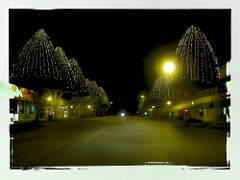 Creative Commons photo by Bill Selak One of the greatest challenges when writing fiction is getting the location just right. I usually have my English students write a short story for me every year and they wrestle with setting, too. I tell them to set their stories in a place and, more often than not, the setting is pretty much the town our school is set in, if they describe it at all.
Creative Commons photo by Bill Selak One of the greatest challenges when writing fiction is getting the location just right. I usually have my English students write a short story for me every year and they wrestle with setting, too. I tell them to set their stories in a place and, more often than not, the setting is pretty much the town our school is set in, if they describe it at all.I don't blame them because describing a place that you don't know well isn't easy. For my Jim Mitchell novels, I created the fictional city of Emerald Valley. If you live near where I do, you'll be able to discern which real places inspired my fictional ones. But what I've done is piece together parts of several cities to make a metaphorical quilt suitable for my needs. The downtown is from one city, but the high school is from another. The burger joint in one from a nearby down placed in my fictional hamlet.
The second novel, Undue Pressure, prominently featured a nearby college where I worked and I have friends still there. Walking the halls and smelling the roses (literally) helped me give the place an authentic feel because it is a real place, just with a different name. For the latest book, I walked all around my town's civic center to be able to write the opening scene with clarity. I like real details even if my town is made up.
Besides, as long as Emerald Valley is real to my readers, that's good enough for me.
Published on October 01, 2017 00:00
September 19, 2017
Five Questions with Tom Allbaugh
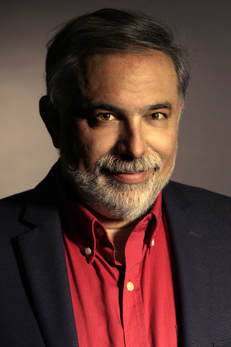 In addition to sharing my own thoughts on the writing process, I want to, from time to time, give readers a chance to meet other creatives and see what they have to say about the highs and lows of sharing their art with others. Today, I bring you Tom Allbaugh. By day, he’s an English professor at Azusa Pacific University, but in his free time he is delving into the world of fiction. A humble and introspective soul, Tom is not new to practicing what he preaches. His essays, poems and stories have appeared in a number of magazines and journals over the years. His first novel, Apocalype TV, was recently released by eLectio Publishing and is available on Amazon in print and on Kindle.
In addition to sharing my own thoughts on the writing process, I want to, from time to time, give readers a chance to meet other creatives and see what they have to say about the highs and lows of sharing their art with others. Today, I bring you Tom Allbaugh. By day, he’s an English professor at Azusa Pacific University, but in his free time he is delving into the world of fiction. A humble and introspective soul, Tom is not new to practicing what he preaches. His essays, poems and stories have appeared in a number of magazines and journals over the years. His first novel, Apocalype TV, was recently released by eLectio Publishing and is available on Amazon in print and on Kindle.When did you first realize you were a storyteller?
I think this occurred in the fourth grade, near Christmas season in 1965, when we came in from morning recess and our teacher, Mrs. Level, gave us half an hour to write a Christmas essay. Maybe she had to fulfill some outcome or other, but it wasn't process-based writing pedagogy. Most of my classmates choked on it. Listening to their groans and gasps, I decided to write satire. When I snickered at something I'd just written, Mrs. Level yelled at me and made me stand up and read it to the class. My essay, however, was well received. Even Mrs. Level was laughing. I learned then that humor was a way to cut tension. Mrs. Level encouraged me after that. When I entered the 8th grade, she was still asking if I was writing.
What do you love about the writing process?
I love that it is possible to revise. I love to start over. I've often said the wrong thing in a talk, as a teacher, for example. And there it is, my un-revised statement hanging out there, ruining my reputation, standing in for what I really meant to say, for the next hour, if not longer. But with writing, I can revise—everything and anything. My wife has accused me of over-revising. She compares it to washing the same shirt five times in a row. The shirt just gets limp, pale, and washed out. She used to say my writing was like that, but I don't know. When I get to sit down to rough drafts, or third drafts, I love going over it and making new discoveries. Over the last few days, I have been looking at my published book and wishing I could change a few things.
What is the hardest part of being a writer?
The hardest part of being a writer are the times when I have to not be a writer and instead have to be someone else—for example, when I have to attend meetings or participate in job searches. The hard part seems to be when I have to step away from writing for weeks at a time. I don't like doing this. I think it makes me grumpy and mean-spirited.
Where do you find your inspiration?
I often get inspired from reading. I often jot ideas down then. My ideas often turn out to be quite tangential and even different from what I'm reading. The idea for what might possibly be my next novel came from reading a wonderful poem by Rilke, I think. I also don't rely too much on inspiration. More often, I just "put the seat of the pants to the seat of the chair," as Flannery O'Connor would unsentimentally say, and get to work. Revising is often when I often come up with—if not moments of inspiration—then at least a-ha! moments.
What are you working on right now?
Right now, I am immersed in trying to market and publicize Apocalypse TV. This is not something I wanted to do, but it is something I have to do. My wife has stepped forward and is showing real gifts with this, by the way. The other night she put our daughter's cake on her Facebook page and got over a hundred responses. Two or three even said they were going to buy the book. All because of the cake.
I am also planning a new novel. I have the initial idea and it is being added to in a folder I've set aside for it. I am getting excited about it.
For more information about Tom and what he’s working on next, check him out at www.thomasallbaugh.com.
Published on September 19, 2017 16:53
September 9, 2017
What's in a Name?
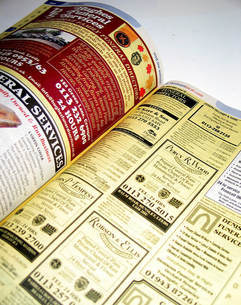 Creative Commons photo by RecycleThis Some people may wonder where writers come up with the names of their characters. I’m not nearly clever enough to have allegorical names like in Pilgrim’s Progress, and names don’t just pop into my head (this guy’s a jerk, his name will be Milhous MacGillycuddy III, or she’s an sweet ingenue named Katrina).
Creative Commons photo by RecycleThis Some people may wonder where writers come up with the names of their characters. I’m not nearly clever enough to have allegorical names like in Pilgrim’s Progress, and names don’t just pop into my head (this guy’s a jerk, his name will be Milhous MacGillycuddy III, or she’s an sweet ingenue named Katrina).Back in the olden days when a phone book was delivered to your house every year, I would use this ultra-scientific method of picking a first name and last name from different sections and then making sure the names mostly went together (Katrina MacGillycuddy, the Russo-Irish assassin with a heart of gold? Probably not.).
Nowadays, this method has entered the internet age. If you’re my friend on social media, you can pretty much guarantee I’ve at least considered your name for a character, particularly when I decide the one I had picked just isn't working or the character’s best friend doesn’t have a name but really should.
The fun part is when I intentionally pick a name to honor someone special in my life. Whether it was one of my outstanding students, or a friend or relative, your can rest assured the guy behind the counter at the burger place or the woman who’s taking pictures for the paper probably didn’t get his or her name at random. Will the person ever read the book and discover the literary “Easter egg”? Maybe, or maybe not.
Not knowing is part of what makes the creative process so fun.
Published on September 09, 2017 00:00
August 20, 2017
Creativity Follows No Timetable
 Creative Commons photo by Pimthida I think all creatives have this fantasy of how we wished inspiration would come to us. For me, I'd like to be sitting at a beach house with a slight breeze coming off the ocean. And, with my laptop ready to go, I would look wistfully into the distance and plot out a three-book series by lunchtime, which would involve a nice fish and chips platter.
Creative Commons photo by Pimthida I think all creatives have this fantasy of how we wished inspiration would come to us. For me, I'd like to be sitting at a beach house with a slight breeze coming off the ocean. And, with my laptop ready to go, I would look wistfully into the distance and plot out a three-book series by lunchtime, which would involve a nice fish and chips platter.Instead, my inspiration comes in spurts, often when my mind is on autopilot. It’s easy to laugh at people who have a waterproof recorder for the ideas that come when they are in the shower but, truth be told, I could use one myself.
When I get that burst of genius, it’s always a question of whether I can hold onto the idea long enough until I can get to a computing device to write it down (Note to self: check out voice recorders at Amazon).
And, as much as I love the pastor at my church, I’ve been known to get ideas for my books during the service. I feel totally guilty plotting a character’s story arc when I should be paying attention to the theology of the Apostles. I’m torn between filing the idea away, hoping it will come back afterwards or continuing down the rabbit hole until the entire thing spools out.
Some of you are probably saying I should take notes and get it out, which sounds fine until you realize that would mean I’m writing “He needs to die a gruesome death” next to a Bible verse about loving your neighbor.
I would like to tell the Muses to only give me inspiration on the weekends between 3 and 5 p.m., but unfortunately creativity seems to be a bit more spontaneous than that.
Published on August 20, 2017 00:00
August 10, 2017
The Art of Professional People-watching
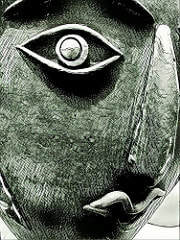 Creative Commons photo by Thad Zajdowicz My wife and I were on vacation recently and we had dinner at a fancy restaurant with a former governor, a big-time political donor, someone who may have been in “the family business” and a superhero in disguise (or a secret agent, we couldn’t tell which).
Creative Commons photo by Thad Zajdowicz My wife and I were on vacation recently and we had dinner at a fancy restaurant with a former governor, a big-time political donor, someone who may have been in “the family business” and a superhero in disguise (or a secret agent, we couldn’t tell which).OK, we’re not positive about the jobs/identities of our fellow dinner guests or server at a fancy restaurant where we enjoyed our meal (we may be foodies on a budget at home, but those rules get bent a bit on vacation), but my wife and I, who are writers and therefore people watchers, decided to take our game to the next level.
Based on our observations (and snippets of conversations that we, as former reporters, may have overheard), we made some (quasi) educated guesses about the secrets they were withholding from the rest of us.
Normally we keep our people peeping to a respectable minimum but we are always on the hunt for good characters. It’s so easy to go through life and not notice anyone but, when you do open your eyes, it’s fascinating who you come across and who they really are, or project themselves to be (hey, I’m as guilty as the next fella in this regard).
As for our secret agent/superhero, I’m sure the decoder ring left at our table was a compete accident.
Published on August 10, 2017 14:36
August 4, 2017
Joe Thomas, Private Eye
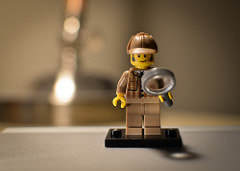 Creative Commons photo by Kevin All storytellers have a beginning, a backstory if you will. Mine started in junior high, when I was inspired to tell the tale of Joe Thomas, Private Eye. Far from brilliant, it was three pages of awful, (or offal, take your pick). It was set in the 1980s when I was a teen, but apparently I was riffing on some bizarre combination of the Hardy Boys, the Maltese Falcon and Magnum, P.I. in my head as I wrote, then typed (yes, typed, like on a typewriter) the terrible tale.
Creative Commons photo by Kevin All storytellers have a beginning, a backstory if you will. Mine started in junior high, when I was inspired to tell the tale of Joe Thomas, Private Eye. Far from brilliant, it was three pages of awful, (or offal, take your pick). It was set in the 1980s when I was a teen, but apparently I was riffing on some bizarre combination of the Hardy Boys, the Maltese Falcon and Magnum, P.I. in my head as I wrote, then typed (yes, typed, like on a typewriter) the terrible tale. My first line of fiction: "It was chilly night in Ol' Saint Louie". I so wish I were kidding. I had never read Edward George Bulwer-Lytton's "It was a dark and stormy night", but I suppose there is truth in the axiom that all good writers start out as bad writers.
The cliché-ridden story featured a car chase, missing money, sinister warehouse and, of course, the Italian mob. But at least now I have proof that sarcasm was my first language. A sample line of dialogue: "Great," I said. "Now the mafia has a price on our heads. Man, I hate Mondays."
A teenage Fitzgerald, I was not.
Thankfully, as I started writing more seriously in college, the dross fell away and my style became a bit more polished. I may not have created a character like Jay Gatsby yet, but Joe Thomas, thankfully, is in my rear-view mirror.
Right where he belongs.
Published on August 04, 2017 10:11



